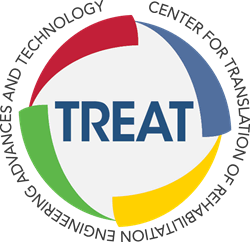- Undergraduate
Bachelor's Degrees
Bachelor of ArtsBachelor of EngineeringDual-Degree ProgramUndergraduate AdmissionsUndergraduate Experience
- Graduate
Graduate Experience
- Research
- Entrepreneurship
- Community
- About
-
Search
All Thayer News
$150k Target Challenge to Commercialize Pediatric Rehabilitation Technology
Jun 02, 2016 | NEPDC
New England Pediatric Device Consortium (NEPDC) and the Center for Translation of Rehabilitation Engineering Advances and Technology (TREAT) announce the release of their 2016 Target Challenge grant opportunity to address an underserved topic in pediatric medicine that has a high need for innovation and device improvement. The 2016 Target Challenge, in partnership with the Foundation for Physical Therapy and the Pediatric Orthopaedic Society of North America (POSNA), was created to foster development and accelerate commercialization of technologies for pediatric rehabilitation.

Thayer is proud to be a TREAT member organization.
"There have been great advances in medicine to keep kids alive, but the appropriate rehabilitation technology available to them, from infancy through adolescence, has not kept up at the same pace. Pediatric rehabilitation services and medical devices must also be developed and evolved to meet the diverse needs and emerging health challenges," says Rick Greenwald, PhD, NEPDC Co-Director, and Adjunct Professor of Engineering at Dartmouth.
Children, like adults, often require rehabilitation or physical therapy in order to reverse or delay potential debilitating or life threatening effects of injury or disability. This challenging field of medicine addresses a wide range of individual needs and encompasses numerous etiologies, including neuromotor, neuromuscular, cognitive and orthopaedic conditions, injuries, or diseases.
"Pediatric rehabilitation needs are expanding and we believe this multidisciplinary coalition will maximize efforts, ultimately granting healthcare providers the technology and wisdom to create the best possible outcomes for children with motor and developmental delays," said Foundation Board of Trustees President Barbara Connolly, PT, DPT, EdD, FAPTA. "It is paramount that the healthcare community work to address these needs so that we can optimize physical functioning in the lives of children."
The 2016 Target Challenge is the third Target Challenge opportunity offered by NEPDC, which is funded as part of the FDA Pediatric Device Consortia Grant Program. Previous Target Challenge programs were aimed at solutions for preventing pediatric pressure ulcers and devices to improve diagnosis and detection of apnea in children. "Continuing the Target Challenge program is exciting for NEPDC. Past Target Challenge award recipients have accelerated their time to market and are delivering products into the hands of children and families who need them," said Ann-Christine Duhaime, MD, Co-Director of NEPDC.
This Target Challenge will provide up to 200 hours of in-kind service to each awardee and distribute up to $150,000 in seed funding to accelerate device commercialization. Awardees will also have access to NEPDC and TREAT networks, which include links to industry, academic, and the greater clinical community, to help overcome the unique challenges surrounding development and translation of pediatric rehabilitation products for clinical and consumer use. "The team at TREAT is very excited about this Target Challenge. By partnering with NEPDC and others, we will have the resources and expertise to help important innovations in the field of pediatric rehabilitation get commercialized and available to the children who need them," says Jonathan Lurie, MD, MS, Co-Director of TREAT.
Following an open call for device solutions, a panel of clinicians, entrepreneurs, and technologists from the Target Challenge partnering organizations will assess submissions based on their likelihood to positively impact pediatric rehabilitation, technical feasibility, market and business potential, and plan to demonstrate efficacy of the proposed device. Finalists will be invited to present to the review panel in August 2016.
"A growing child is an especially unique challenge for fields such as orthopaedics, and POSNA is excited to support this opportunity to advance innovations in current technology for rehab," says James McCarthy, MD, MHCM, President of POSNA.
Link to source:
http://nepdc.org/press_releases/2016%20Target%20Challenge%20Press%20Release_Final.pdf
For contacts and other media information visit our Media Resources page.
